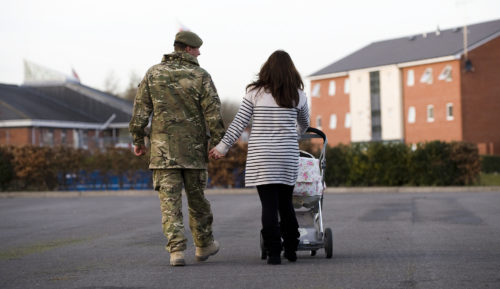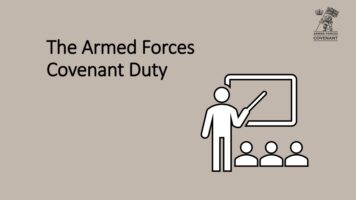Covenant support for the Armed Forces community: Housing
In housing, Covenant support for the Armed Forces community includes the following:

“I don’t know about civilian housing options, as the Armed Forces have always provided me with accommodation”
Information and guidance on civilian housing provides serving personnel and their dependants with civilian housing information for those wishing to move to civilian accommodation at any stage of their Service career. This includes an annual programme of civilian housing briefings to help inform and guide Service personnel and their families about the choices available to them and the need to plan ahead. You can also access housing advice for veterans or other organisations who can help.
Help with home ownership includes the Forces Help to Buy scheme, through which Service personnel can borrow up to £25,000 interest-free over 10 years to help create a deposit for a new home. Another way to get help is through the Government’s affordable home ownership schemes. Own your own home also provides a range of schemes that make home-buying more affordable.
“I incur costs from having to gain Consent to Let from my mortgage provider, or change my mortgage to buy-to-let, when the Armed Forces re-locate me”
Since 2016, a number of the UK’s largest banks and building societies have committed to allowing Armed Forces personnel to rent out their homes without facing higher mortgage costs or having to change their mortgage when posted overseas or redeployed within the UK.
The following links provide the webpages where some of the banks and building societies that have made this commitment outline what support they provide to the Armed Forces in this area: Co-operative Bank; HSBC; Nationwide; NatWest; Santander; TSB; Virgin Money; Yorkshire BS.
News story: Banks offer better deal on mortgages for Armed Forces personnel (for Armed Forces personnel posted overseas)
News story: Boxing Day deal on mortgages for Armed Forces (for personnel redeployed within the UK)
“I incur extra legal costs from having to sell my house and buy a new one when the Armed Forces re-locate me”
Armed Forces personnel continue to benefit from the Refund of Legal Expenses (RLE) package. This is available to any Service person who sells and buys a property because of a requirement to re-locate for Service reasons.
“The UK home I own is unoccupied as the Armed Forces have posted me abroad, but I still have to pay Council Tax”
As outlined in JSP 752 -Tri-Service regulations for expenses and allowances, MOD pays a tax-free allowance called Council Tax Relief for certain Service personnel on specified operations or assignments. In 2011, MOD doubled the rate from 25% to 50%, under the auspices of the Covenant.
News story: Council Tax Relief for personnel on operations increased
“I haven’t built up sufficient ‘local connection’ in accordance with my local authority’s social housing allocation scheme, as the Armed Forces have re-located me away from my home area”
Rules around allocation of social housing are different in the four home countries of the UK.

Regulations, first introduced in 2012, set out criteria under which members of the Armed Forces community in England cannot be disqualified from social housing because of a local connection requirement. The June 2020 statutory guidance for local authorities in England makes clear that local authorities in England are expected to disapply any local connection requirement from divorced or separated spouses or civil partners of Service personnel who are required to move out of accommodation provided by the Ministry of Defence.
Exemptions to local connection criteria also exist in Wales, provided that the applicant can evidence that they were posted to an area in Wales during their time in the Armed Forces. These exemptions are explained in the Welsh Government’s guidance.
In response to the Scottish Veterans’ Commissioner’s recommendations, the Scottish Government published a Practice Guide for social landlords on allocations for people leaving the Armed Forces. It includes guidance on giving priority to Service leavers and on ensuring that veterans are not at a disadvantage when applying for social housing due to Service time spent outside an area. Following consultation, the Scottish Government published a ministerial statement, in March 2021, which sets out the circumstances and general criteria which would act as the reference for exercising the power to modify local connection.
‘Local connection’ is one of the areas the Covenant Legal Duty covers. To find out more, see section 4C2 of the Legal Duty statutory guidance.
Covenant case studies: ‘Local connection’ requirement for social housing
“When considering me for social housing, my local authority hasn’t taken into account the impacts of Service life”
Statutory guidance on allocation of accommodation in England, first published in June 2012, and statutory guidance on allocation of accommodation in Wales, first published in March 2016, both ensure that ‘additional preference’ – high priority – for social housing is given to certain groups in the Armed Forces community. Also, the June 2020 statutory guidance sets out how local authorities in England can ensure that members of the Armed Forces community suffering from mental ill health (wholly or partly attributable to Service) are given appropriate priority for social housing. It should be noted that a mental health issue as a result of Service can continue or start years after the person has left the Armed Forces.
The Scottish Government published new and refreshed guidance to improve awareness of the Armed Forces community’s housing needs. The refreshed Local Housing Strategy guidance encourages local authorities to consider fully the housing requirements of the Armed Forces community. It was also strengthened to encourage appropriate engagement with relevant organisations, such as Veterans Scotland, to understand better the needs of this community when developing the Strategies.
Availability of suitable social housing is one of the areas the Covenant Legal Duty covers. To find out more, see section 4C3 of the Legal Duty statutory guidance.
Covenant case studies: Availability of suitable social housing
“I can’t communicate with my local authority because the Armed Forces have posted me overseas”
For example, members of the Armed Forces community who are overseas might not be able to access online forms due to military operational requirements preventing access to the Internet. Or, they might have difficulty phoning the housing body’s helplines during normal UK office hours due to time differences.
Communications with local authorities in relation to social housing, homelessness and Disabled Facilities Grants are covered by the Covenant Legal Duty. To find out more, see section 4C4 of the Legal Duty statutory guidance.
“My disabled family member spends more time in an unadapted home, as the Armed Forces have re-located us, and we want to keep living in private accommodation”
When an entitled Service family needing adaptations lives in Ministry of Defence accommodation, the MOD ensures that suitable accommodation is provided, in line with its policies. Also, on occasions, the MOD may fund adaptations to private accommodation for wounded, injured and sick personnel transiting out of Service.
Local housing authorities in England and Wales have a statutory duty to provide home adaptations for people of all ages and tenures eligible for a Disabled Facilities Grant, subject to a needs assessment, eligibility criteria and a means test. This can include Armed Forces personnel or their families living in their own accommodation, and veterans. Guidance has been published for local authorities in England on the effective delivery of the Disabled Facilities Grant. It includes a section on the Armed Forces community.
In Scotland, this is called the Scheme of Assistance. The Housing (Scotland) Act 2006 (Scheme of Assistance) Regulations 2008 state that where adaptations required are essential to the disabled person’s needs and the required work is structural (or involves permanent changes to the house) the applicant must also be awarded a mandatory grant.
Disabled Facilities Grants is one of the areas the Covenant Legal Duty covers. To find out more, see section 4F of the Legal Duty statutory guidance.



